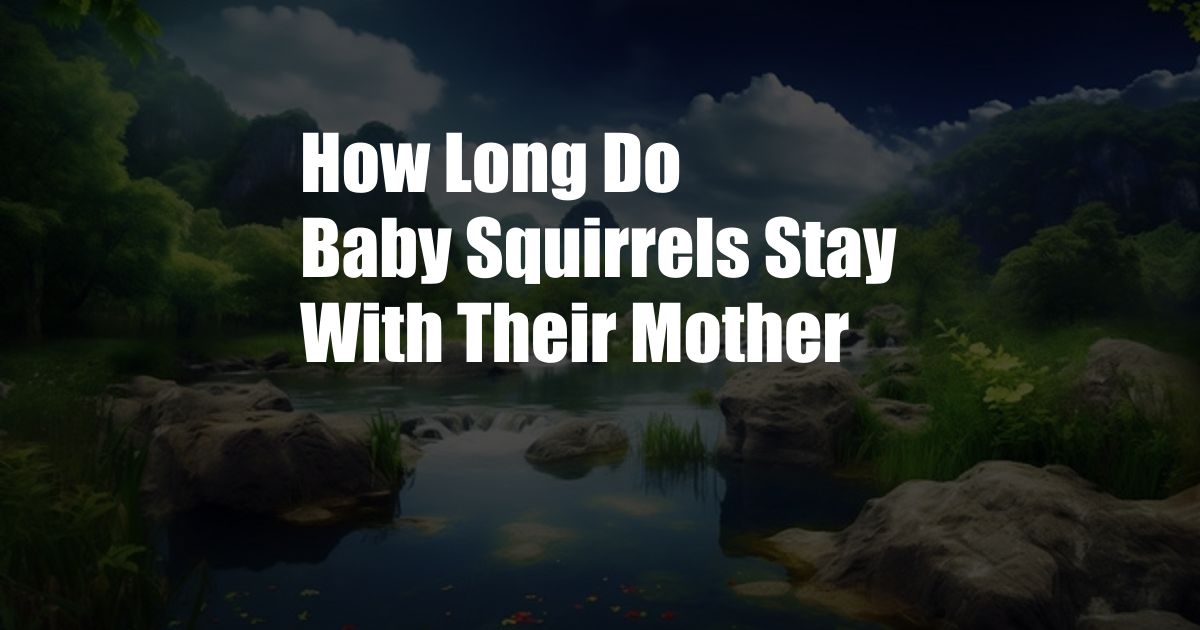
How Long Do Baby Squirrels Stay With Their Mother?
As a young girl, I stumbled upon a baby squirrel that had fallen out of its nest. Its tiny body and trembling cries tugged at my heartstrings, prompting me to bring it home. However, as I embarked on the journey of caring for this helpless creature, a question lingered in my mind: “How long do baby squirrels stay with their mother?”
The Nurturing Embrace of Motherhood
In the wild, baby squirrels are born blind, hairless, and completely helpless. Their survival hinges upon the unwavering care and nourishment provided by their mother. Mother squirrels construct cozy nests high in the trees, ensuring warmth and protection for their fragile offspring. For the first six to eight weeks of their lives, baby squirrels are entirely dependent on their mother’s milk for sustenance.
Fostering Independence: A Journey of Growth
As baby squirrels mature, their bond with their mother gradually shifts. They become more adventurous, venturing outside the nest and exploring their surroundings. During this transition, the mother’s role evolves from providing constant care to nurturing and guiding her young. She teaches them essential survival skills, such as foraging for food, navigating their habitat, and avoiding potential dangers.
The Age of Independence: Spreading Their Wings
By the time they are eight to ten weeks old, baby squirrels are fully weaned and ready to spread their wings. They embark on a solitary journey, seeking their own territories and establishing their independence. However, the bond between mother and young is not completely severed. For several months after leaving the nest, young squirrels may still return to their mother for guidance, support, and the occasional meal.
Keeping an Eye Out for Orphaned Squirrels
While it is common for young squirrels to venture out on their own, it is important to be aware of orphaned squirrels. If you encounter a baby squirrel that appears weak, injured, or alone, it may have been abandoned or its nest may have been destroyed. In such cases, seeking professional wildlife rehabilitation assistance is crucial for the squirrel’s survival.
Tips for Caring for Baby Squirrels
If you come across an orphaned baby squirrel, here are some tips for providing temporary care:
- Keep the squirrel warm and place it in a secure container lined with soft material.
- Do not feed the squirrel milk or water. They require a specialized formula available from wildlife rehabilitators.
- Avoid handling the squirrel excessively as it can stress it out.
- Contact a wildlife rehabilitator as soon as possible for proper care and release back into the wild.
FAQs on Baby Squirrels
Q: How old should a baby squirrel be when it leaves the nest?
A: Baby squirrels typically leave the nest between eight and ten weeks of age.
Q: Can I keep a baby squirrel as a pet?
A: Squirrels are wild animals and should not be kept as pets. It is illegal in many areas to possess wildlife without a permit.
Q: When should I call a wildlife rehabilitator for an orphaned squirrel?
A: If you encounter a baby squirrel that is weak, injured, or alone, contact a wildlife rehabilitator immediately.
Conclusion
The relationship between a baby squirrel and its mother is a remarkable bond that nurtures independence and resilience. Baby squirrels spend their early weeks in the protective embrace of their mother, relying on her for nourishment and care. As they mature, they gradually gain independence, venturing out into the world while still seeking guidance and support from their mother. By understanding the intricacies of this relationship, we can appreciate the beauty of nature and the importance of preserving our wildlife.
If you enjoyed this article, please share your thoughts and experiences in the comments section below. Let’s continue the conversation!